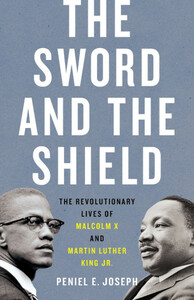Take a photo of a barcode or cover
105 reviews for:
The Sword and the Shield: The Revolutionary Lives of Malcolm X and Martin Luther King Jr.
Peniel E. Joseph
105 reviews for:
The Sword and the Shield: The Revolutionary Lives of Malcolm X and Martin Luther King Jr.
Peniel E. Joseph
I like that the author tried to paint a more fulsome picture of the lives and views of MLK and Malcolm X, to move beyond the snapshots that are so embedded in our culture. He goes to great lengths to show the evolution of MLK and how by the end of his life he was fairly closely aligned to MLK. For me, the shortcoming of the book is that it reads like an academic paper rather than a story. It is meticulously researched and well cited, relying on actual quotes from transcripts and documents. But that leaves a gap in the understanding of MLK and Malcolm X as humans, with complex emotions and personal journeys beyond their public personas. The book seemed designed to prove out its thesis, and to do that it can become repetitive in some places.
The Civil Rights Era was made up of many more people than Martin Luther King Jr and Malcolm X, but they are two of the defining figures of the mid 20th century. This is the first joint book I have read about them since James Cone's Martin & Malcolm & American. It has been at least 20 years since I read that book, and throughout The Sword and the Shield, I tried (and failed) to remember how Cone handled the discussion. I need to go back and reread it.
I was glad that I have recently read a biography of Malcolm X as well as King's last book, Where Do We Go From Here, which had details about their lives front and center in my mind. I am far from a scholar of either, but I am also not unfamiliar with them. I still learned plenty, and the focus on them together does intentionally put their work on tension even if they only directly met one time.
As much as anything this is a reminder of what was lost with their deaths. No one like Malcolm X and Martin Luther King Jr is only their flattened memories. Both were complex people that were significantly changing over time, as was the central theme of Marble's biography of Malcolm X and Cornell West's compiled Radical King. Kendi's three categories of racial relationships (segregationists, assimilationists, or antiracists) in How to be an Antiracist reminded me of how both King and Malcolm X were antiracists much of the time, but in quite different ways.
Another theme of the book that was striking was how Peniel pointed out how both frequently framed their work as helping African Americans to become citizens. It was still six months after Malcolm X was killed that the Voting Rights Act of 1965 was signed into law and making a significant impact on the reality of Black citizenship. A citizen that cannot vote is not wholly a citizen. That was far from the last point of disparate realities between racial groups' citizenship. Still, it was a stark reminder of how many are citizens (then and now) that cannot act on their citizenship for a variety of reasons, many of them due to systems that intentionally want to minimize minority citizenship.
The recounting both stories is well done and well balanced. They were very different men, and that is probably not paid attention to enough. Martin Luther King Sr was the highest-paid Black preacher in Atlanta. When Martin Luther King Jr moved to Birmingham, his first senior pastorate, he became the highest-paid Black pastor in Birmingham. Malcolm X's father died when he was young; his mother was placed in a mental asylum when he was a preteen. While King was in college early and finished with a PhD at 25, Malcolm X was paroled at 26.
There is too much to talk about here, and I listened to this (mostly while doing yard work when I didn't have an easy ability to take notes.) I need to read it again, but first, I need to re-read Cone's book.
Joseph achieves what he set out to do, by taking the very simplistic versions of these two monumental men and try and give their lives more context to see that both were compassionate and both were revolutionary. Both were loyal and both were dissidents. While reading this book, I learned so much about the growth that both men did in their lives. Both were imperfect, yet they were still better people than most I have ever known. For sure a necessary read.
https://www.nyjournalofbooks.com/book-review/sword-and-shield




